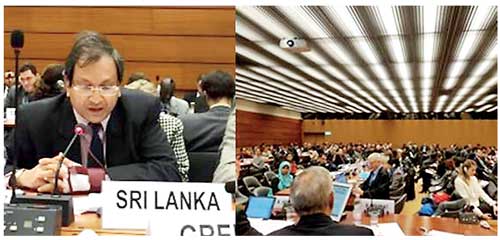Thursday Feb 19, 2026
Thursday Feb 19, 2026
Monday, 6 February 2017 00:00 - - {{hitsCtrl.values.hits}}
Switzerland, a co-chair of the UN intergovernmental consultations on the modalities for the process for adoption of the ‘Global Compact for safe, orderly and regular migration’, has commended the Abu Dhabi Dialogue (ADD) chaired by Sri Lanka for its proactive action to seek close engagement in the process of development of the Global Compact on Migration (GCM).
Pietro Mona, Deputy Head, Global Program on Migration and Development of the Swiss Agency for Development and Cooperation, acknowledged the leadership of Sri Lanka and the ADD troika, which also includes Kuwait and the United Arab Emirates (UAE), for initiating such a  dialogue within the ADD even before the resolution on modalities for the intergovernmental negotiation on the Global Compact was adopted by the UN General Assembly.
dialogue within the ADD even before the resolution on modalities for the intergovernmental negotiation on the Global Compact was adopted by the UN General Assembly.
The Co-Chair made these remarks in response to an intervention made by Sri Lanka’s Permanent Representative to the UN in Geneva, Ambassador Ravinatha Aryasinha, at the informal dialogue of the Global Forum on Migration Development (GFMD) on the ‘Global Compact on Safe, Orderly and Regular Migration’, held in Geneva on 2 February.
The ADD, a Regional Consultative Process (RCP) between labour sending Asian states and labour receiving Gulf Cooperation Council (GCC) states, aims to foster dialogue on contractual labour mobility in the region.
Ambassador Aryasinha observed that given the significant labour mobility flows in the Asia-GCC corridor and the immense contribution the mobility of temporary contract workers makes to the countries of origin and destination, the ADD Ministerial Meeting chaired by Sri Lanka’s Minister of Foreign Employment Thalatha Atukorale, which concluded in Colombo on 24 January 2017, agreed to explore the prospects of engagement in international deliberations on the Global Compact (GCM). He said the ADD already has one of the lowest remittance transfer cost corridors, an active qualification recognition scheme, was using advanced technology in recruitment, had proven developmental impact in sending and receiving countries and has been engaging governments, business, academia and civil society in its programs.
Given these concrete pragmatic practices and effective solutions evolved within the region, he said the ADD is well positioned to make a valuable contribution to the Global Compact (GCM) consultation process.
While aligning himself with the intervention by Ambassador Aryasinha, the representative of the UAE noted that the ADD troika has asked the International Organization for Migration (IOM) to facilitate the engagement of ADD in this international dialogue as a key Regional Consultation Process (RCP). He said IOM has agreed to work with the ADD troika and eventually ADD Member States to define the process by which the group can be invited to engage and contribute, as per the modalities adopted.
He said the goal is twofold - to seek to incorporate into the Global Compact the experiences, lessons learned and innovative solutions produced by our region, and to further improve the regional capacity to govern labour migration with a view to increase its development impact and implement the relevant SDGs in the UN Development Agenda.
The representatives of Qatar and the Philippines, which are ADD members, also associated themselves with these sentiments at the meeting.
Following on the Ministerial Directive as outlined in the ADD ‘Colombo Declaration’, under the chairmanship of Ambassador Aryasinha, the ADD troika and representatives of the ADD Secretariat, met with the representatives of the IOM on the sidelines of the GFMD meeting in Geneva to discuss the operational aspects of ADD’s engagement with the GCM, for which the IOM has agreed to extend its support.
Following the adoption of the modalities resolution on the GCM by the UNGA in March this year, the preparatory process is scheduled to begin in April this year with extensive consultations on related thematic issues involving experts in Geneva, New York and Vienna.